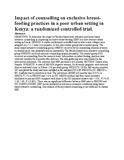Impact of counselling on exclusive breast-feeding practices in a poor urban setting in Kenya: a randomized controlled trial.

View/
Date
2012-10Author
Ochola, SA
Labadarios, D
Nduati, RW
Type
ArticleLanguage
enMetadata
Show full item recordAbstract
OBJECTIVE:
To determine the impact of facility-based semi-intensive and home-based intensive counselling in improving exclusive breast-feeding (EBF) in a low-resource urban setting in Kenya.
DESIGN:
A cluster randomized controlled trial in which nine villages were assigned on a 1:1:1 ratio, by computer, to two intervention groups and a control group. The home-based intensive counselling group (HBICG) received seven counselling sessions at home by trained peers, one prenatally and six postnatally. The facility-based semi-intensive counselling group (FBSICG) received only one counselling session prenatally. The control group (CG) received no counselling from the research team. Information on infant feeding practices was collected monthly for 6 months after delivery. The data-gathering team was blinded to the intervention allocation. The outcome was EBF prevalence at 6 months.
SETTING:
Kibera slum, Nairobi.
SUBJECTS:
A total of 360 HIV-negative women, 34-36 weeks pregnant, were selected from an antenatal clinic in Kibera; 120 per study group.
RESULTS:
Of the 360 women enrolled, 265 completed the study and were included in the analysis (CG n 89; FBSICG n 87; HBICG n 89). Analysis was by intention to treat. The prevalence of EBF at 6 months was 23·6 % in HBICG, 9·2 % in FBSICG and 5·6 % in CG. HBICG mothers had four times increased likelihood to practise EBF compared with those in the CG (adjusted relative risk = 4·01; 95 % CI 2·30, 7·01; P = 0·001). There was no significant difference between EBF rates in FBSICG and CG.
CONCLUSIONS:
EBF can be promoted in low socio-economic conditions using home-based intensive counselling. One session of facility-based counselling is not sufficient to sustain EBF.
URI
http://www.ncbi.nlm.nih.gov/pubmed/23039968http://erepository.uonbi.ac.ke:8080/xmlui/handle/123456789/17446
Citation
Public Health Nutrition. 2012:1-8Publisher
Department of paediatrics, University of Nairobi
Subject
CounsellingExclusive breast-feeding practices
Poor urban setting
Randomized controlled trial.
Kenya
Description
Journal article
Collections
- Faculty of Health Sciences (FHS) [10378]
